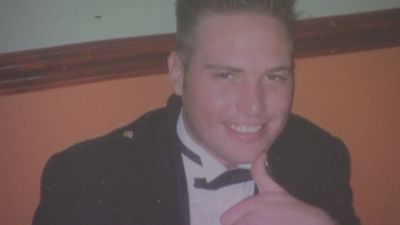Luke McCulloch: The popular soldier whose death is still felt today

In 2006, the soldiers of C Company, 3rd Battalion the Parachute Regiment, posed for a photo at their base in Sangin in Afghanistan's Helmand Province. At that time, Sangin was the most dangerous place on earth, the centre of British forces' fight against the Taliban. The Paras were sent to Helmand Province after the 2001 invasion of Afghanistan, a response to the September 11 terror attacks in the United States. The campaign lasted 20 years and cost the lives of 457 British soldiers - including Luke McCulloch of C Company, who was killed before the photograph was taken.
As part of our series Afghanistan: Photo From The Frontline, ITV News Senior Correspondent Paul Davies speaks 15 years on to those affected by Luke's death.
On Wednesday, September 6 2006, a Taliban fighter aimed a mortar at the British military base at Sangin in Afghanistan's Helmand Province.
The act of aggression was nothing out of the ordinary, at that time the fortified base at Sangin was being attacked on a daily basis.
This assault, however, would have deadly consequences, ending one life and casting a cloud over many others.
Luke McCulloch was 21 years old, an Irish Ranger who had volunteered for his attachment to the Parachute Regiment when they were sent on what would become one of the most dangerous postings of recent times.
Talking to veterans of that tour, it is clear he quickly became one of the most popular members of their company. They all remember the day he died. It is not overstating the fact to say that several are still haunted by it.
Shrapnel from the exploding mortar hit Luke's head inflicting terrible brain injuries.
Corporal Trevor Coult, who had been sitting next to Luke, recalls the dust and smoke clearing to reveal his own lower body covered in blood.
It took a few seconds to realise the blood was not his own, but that of the young man now slumped at his feet.
Trevor Coult had been awarded the Military Cross for bravery shown in an earlier deployment in Iraq, but says what he witnessed in Sangin resulted in a mental breakdown.
He still has nightmares.
Colour Sergeant Richard Spence admits he carries his own burden of guilt.
He had been Luke McCulloch's friend and mentor and was the one who persuaded him to volunteer for the Afghan mission.
Talking about Luke's death for the first time he told us: "Luke was a good friend. I convinced him to go to Afghanistan and sadly he didn't come back. That's something I wrestle with every day."
Richard Spence breaks down briefly as he describes the helicopter journey during which army medics lost their battle to keep his friend alive.
He says the passing years have, if anything, seen the burden he carries get heavier: "As you get older it becomes worse.
"You think where would Luke be now, what would he be doing if he was still alive?"
Major Paul Blair is the Paras commanding officer who will always wonder if he could have done more to prevent Luke's death. Should he have insisted that his men wore more protective equipment even in the blazing heat of an Afghan summer?
"Did I not correctly interpret the threat, did I not take enough action? I have spent many years trying to deal with that," he told me.
When I asked if he had dealt with it yet he paused before replying: "Not entirely. I don't think I ever will."
Luke's mother, Elaine McCulloch Brand, told me her life changed completely the day her son died. She reveals that she had a premonition that he wouldn't be coming back from Afghanistan
'Something different happened when we were saying goodbye': Elaine McCulloch Brand tells ITV News Senior Correspondent Paul Davies about the last time she saw her son alive
"When we were saying goodbye at Brize Norton, I held onto him and said I don't think I am going to see you again," she said.
"He said 'don't worry Mum, I'm invincible' but it was a horrible gut feeling that something bad was going to happen."
Elaine fell out with the Ministry of Defence when she criticised the Paras practice of not wearing full protective gear.
"I'm afraid I have become a bit of a hermit these days," she told me.
"I find it difficult to leave the house and prefer the company of my horses and dogs to people. I miss Luke every day."
Luke McCulloch was one of more than 450 British servicemen and women to lose their lives in Afghanistan and each of those deaths created ripples that are still affecting peoples lives today.
Meeting some of those touched by Luke's death and hearing their ongoing stories has left me with a much clearer picture of the true cost of this war.
Read more stories from our series Afghanistan: Photo From The Frontline